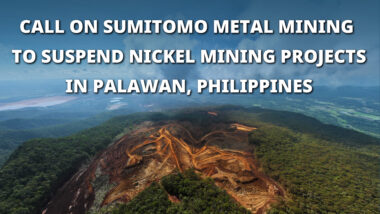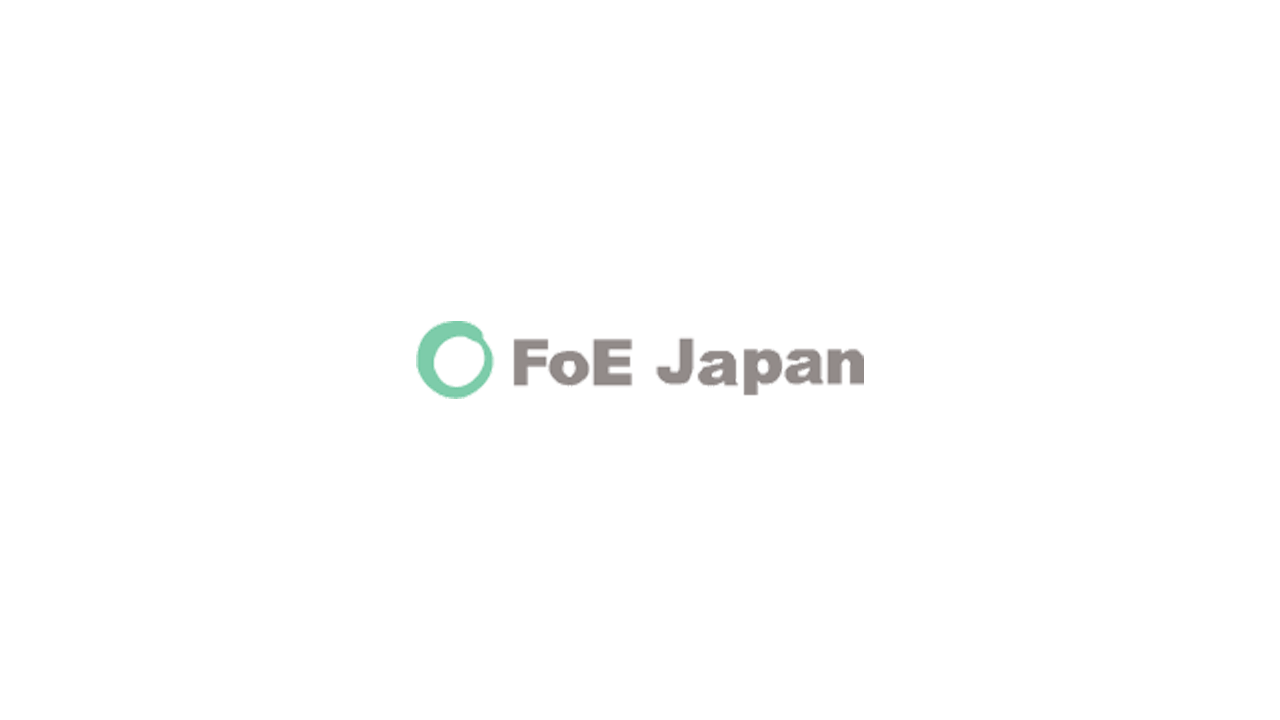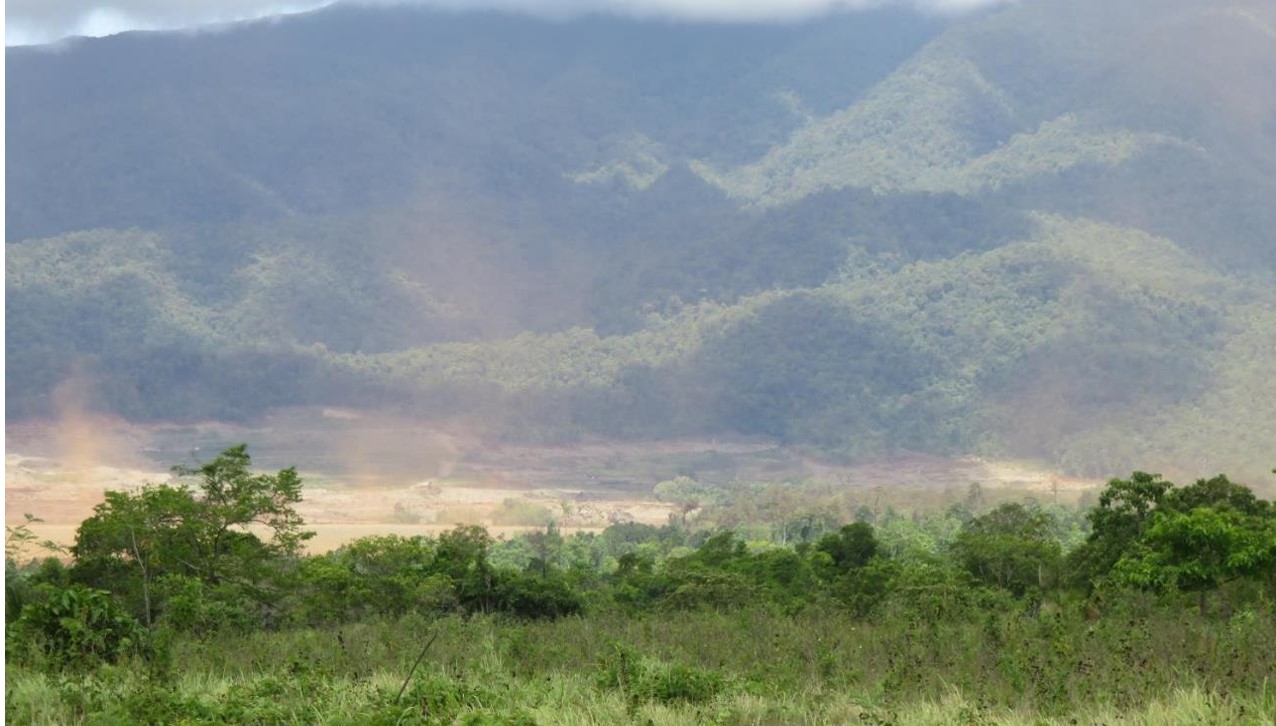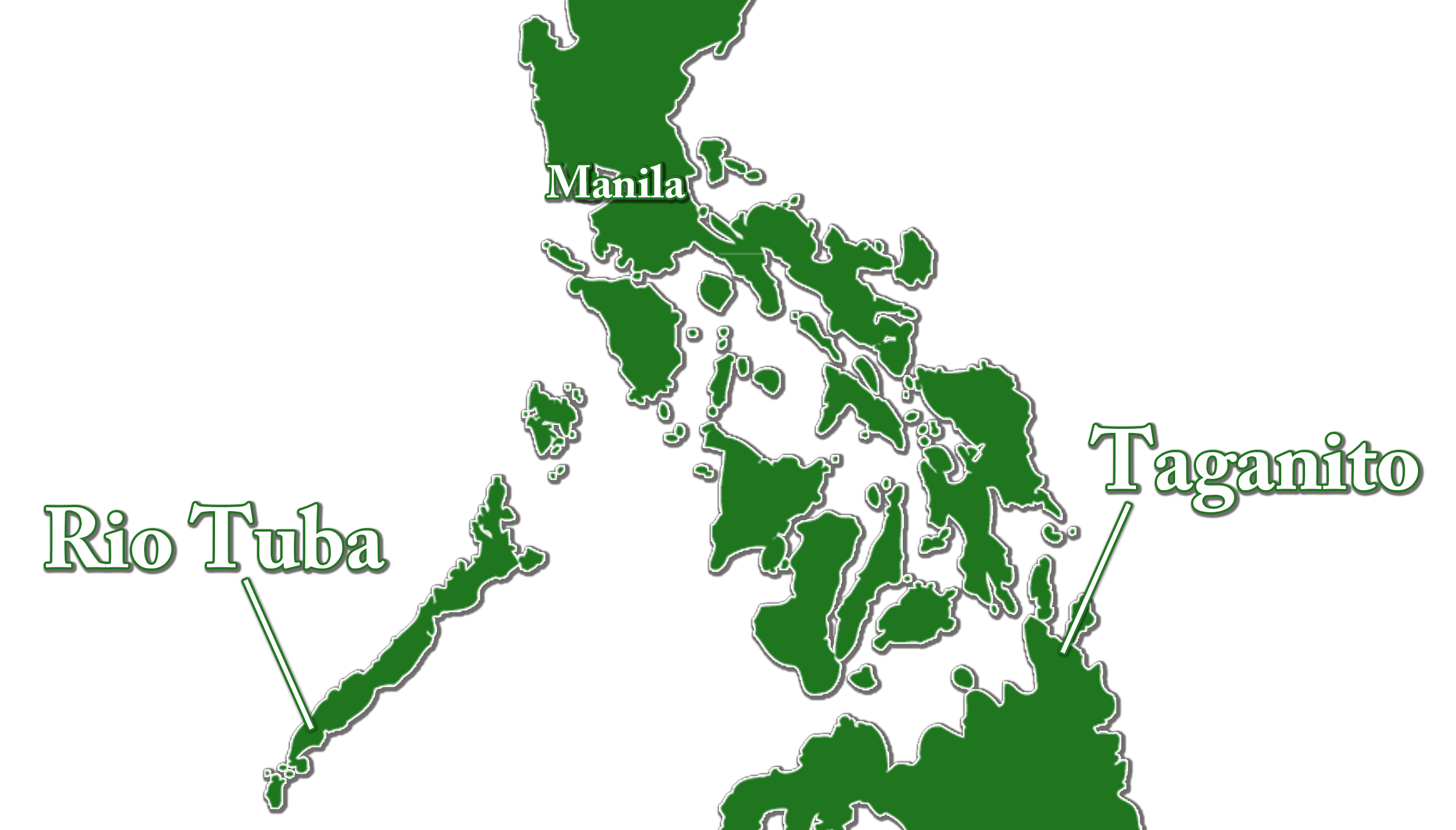86 Civil Society Groups from All Over the World Urge Sumitomo Metal Mining to Suspend Nickel Mining and Processing Operations in Palawan, the Philippines — Condemning No Effective Water Pollution Measures over a Decade and Concerned about Possible Further Damage to Local Communities
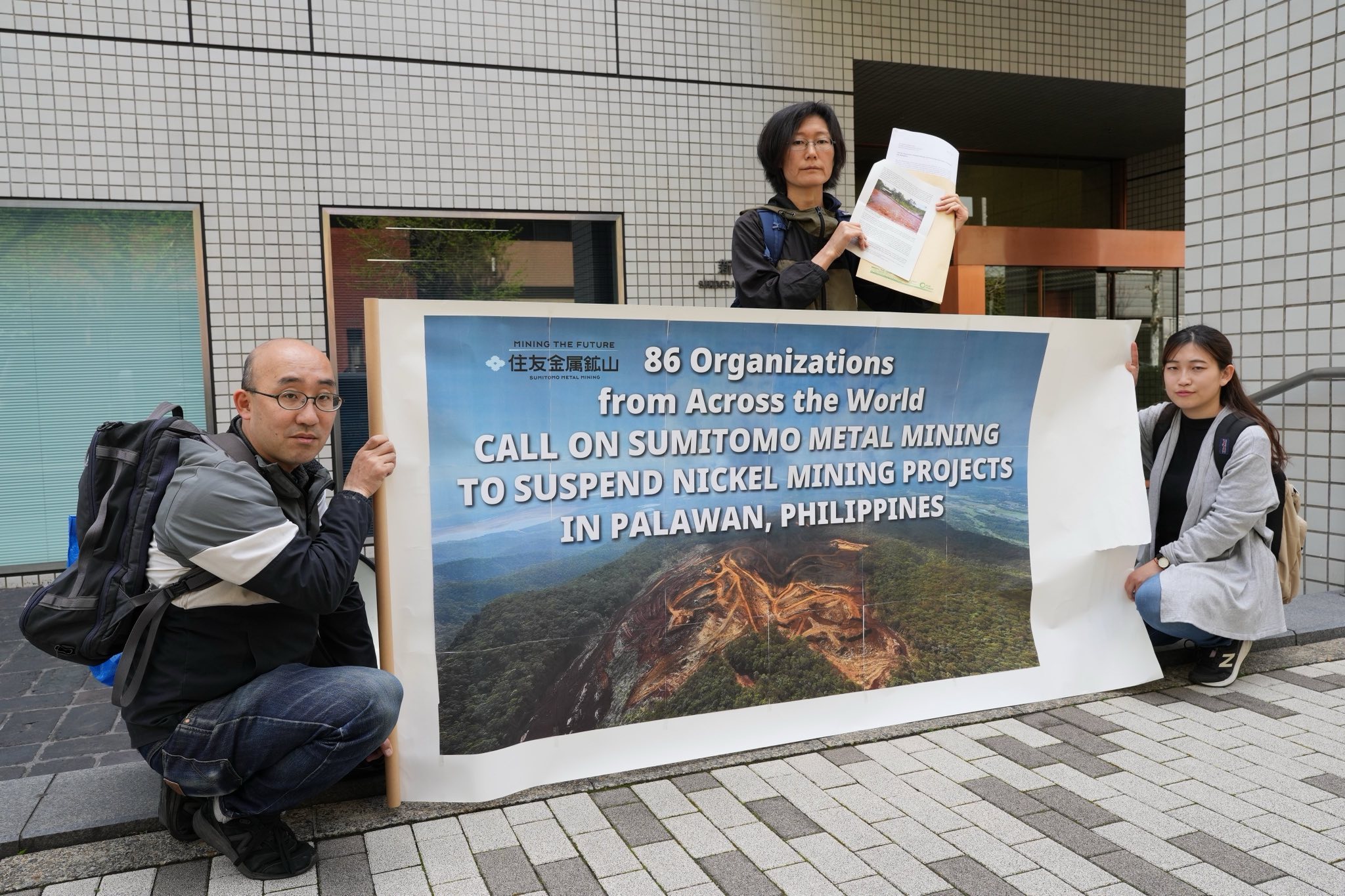
On April 14, 2025, 86 civil society organizations, including those working at international and regional levels plus organizations working nationally in 39 countries, submitted a petition to call on Sumitomo Metal Mining Co., Ltg. (SMM) to immediately suspend the Coral Bay Nickel Processing Project and the Rio Tuba Nickel Mining Project in Palawan until effective and publicly verifiable countermeasures are developed and implemented to avoid destructive impacts on local communities. On the same day, the initial conveners for signatures on the petition (Environmental Legal Assistance Center (ELAC), Legal Rights and Natural Resources Center (LRC) / FoE Philippines, Pacific Asia Resource Center (PARC), Friends of the Earth Japan) also launched a website to collect individual signatures.
According to a recent report by an expert who has been conducting water quality surveys since 2009 in cooperation with FoE Japan, hexavalent chromium exceeding domestic and international environmental standards has been detected constantly during the rainy season at a fixed point in the Togpon River flowing from the existing mining concession of the Rio Tuba Nickel Mining. In September 2024, the highest concentrations of hexavalent chromium was observed in 15 years of water quality studies. It is clear that the projects have failed to effectively address water pollution for more than a decade, despite the repeated calls of civil society groups for action.
With expectations of growing global demand for nickel in the context of efforts toward a decarbonized society, mining operations have begun to expand in the region. However, as no effective pollution mitigation measure has been taken to date, it is highly likely that similar water pollution will spread to other rivers. It is undeniable that indigenous peoples and farmers who depend on the rivers for their daily lives and agriculture in the vicinity of the projects may be adversely affected for decades to come. More local communities will also be exposed to health damage risk because hexavalent chromium is a highly toxic substance that is carcinogenic and also causes skin irritation, etc.
SMM is the parent company (100%) of Coral Bay Nickel Corporation (CBNC), which has been operating the HPAL processing plant in Batarasa of southern Palawan since 2005, and all the nickel-cobalt mixed sulfide produced by CBNC is exported to SMM’s plants in Japan to produce battery materials, etc.. The company’s battery materials have been officially adopted by Tesla as well as by Toyota Motor Corporation for their in-car batteries. The company also have a 26% stake in Nickel Asia Corporation (NAC), the largest shareholder (60%) in Rio Tuba Nickel Mining Corporation (RTNMC), from which it procures raw materials.
Shigeru Tanaka, Executive Director of PARC, noted that “The only reason climate change has become such an urgent issue is because developed economies have failed to act for decades. Communities in the Philippines should not have to pay the price for the need for swift decarbonization. It is time we put a stop to this reckless, unsafe and irresponsible mining, and seriously debate other means of realizing the Paris Climate Goals. It is at least clear that this mining will not even pass the smell test on human rights due diligence.”
Leon Dulce, Campaigns Support and Linkages Coordinator for LRC-FoE Philippines, stated that “The CBNC-SMM’s longstanding environmental damages are a clear example of an unjust energy transition mineral pathway. It means electric vehicle corporations like Panasonic and Tesla are profiting from CBNC-SMM’s nickel value chain while host communities in the Philippines are left to suffer miniscule royalties that pale in comparison to the damages caused by hexavalent chromium pollution. Both Japan and the Philippines are violating international accountability frameworks such as the UN Guiding Principles on Business and Human Rights–which are increasingly recognized by courts around the world such as in the Netherlands’ Vereniging Milieudefensie et al. v. Royal Dutch Shell PLC case as a requirement that governments must observe.”
Hozue Hatae, FoE Japan’s Development and Human Rights Team Campaigner, commented, “From the results of the 15-year water quality surveys we have conducted in the vicinity of the Rio Tuba Nickel Mine, it is clear that SMM along with allied businesses have still failed to develop and implement effective water pollution control measures. The well-being of local communities must not be threatened in the long term under the name of “decarbonization”. In order to protect the health, livelihoods, and human rights of the local communities living around the projects, SMM must fulfill its responsibilities as an investor and procurer by suspending its nickel mining and smelting operations in the region until effective measures are developed and implemented in a transparent manner.”
“ELAC is very much concerned that despite our existing laws on natural forest such as the Strategic Environmental Plan for Palawan, a Special Tree Cutting Permit was issued to the Rio Tuba Nickel Mining Corporation to cut 52,000 trees in Mt. Bulanjao Range. There have been studies on the presence of old-growth forest and the rich biodiversity of Bulanjao Range. This is very disturbing because there is a watershed in the area and there are farmlands below the range. Until now we have not completely resolved the pollution of lowland areas in the last decades. With the removal of thousands of trees, deforestation, displacement of wildlife and local communities will be the adverse consequences. This will ultimately put at risk our biodiversity and communities’ welfare and make them less climate-resilient.” said Grizelda Mayo-Anda, Executive Director of ELAC.
For more information, please see the following petition.
> PDF is available here
Call for Suspension of Nickel Mining and Processing Operations in Parawan, the Philippines
April 14, 2025
Mr. Nobuhiro Matsumoto
President and Representative Director
Sumitomo Metal Mining Co., Ltd.
We, the undersigned Civil Society Organizations and individuals, call on Sumitomo Metal Mining Co., Ltg. (SMM) to immediately suspend its nickel processing operation in Palawan until effective and publicly verifiable countermeasures are developed and implemented to avoid destructive impacts on local communities. It is deeply regrettable that your company along with allied businesses have failed to take effective measures to address the ongoing pollution of toxic heavy metals in the waters that flow out of the nickel mining site related to your operation for over a decade.
Communities including those of Indigenous Peoples in Palawan Province, Philippines residing in the vicinity of the HPAL processing plant operated by a wholly owned subsidiary of yours, Coral Bay Nickel Corporation (CBNC)[1], and of the mining site of Rio Tuba Nickel Mining Corporation (RTNMC) to which you have business relations both in terms of investments and supply chains, have been exposed to health damage risk due to the pollution. Furthermore, RTNMC has begun expanding its operations to Mt. Bulanjao in addition to its existing mining concession without offering any verifiable countermeasures to prevent water pollution from the new mining operations. It is clear as day, that Indigenous Peoples and farmers, who depend on the rivers and streams that flow from Mt. Bulanjao for domestic and agricultural water, will continue to suffer from such pollution over decades to come.
With expectations of growing global demand for nickel in the context of efforts toward a decarbonized society[2], including the promotion of electric vehicles (EVs) and renewable energy, it is a situation that is far from a “just” energy transition if more local communities are harmed by the new mining expansion. Thus, in order to ensure the protection of the life and human rights of the local communities, we demand SMM to do the followings;
- Disclose a set of tested and verifiable measures to stop the ongoing water contamination surrounding the existing mining operation area, along with a timeline to implement those countermeasures;
- Disclose a set of tested and verifiable measures to prevent future water contamination surrounding the new mining operation at Mt. Bulanjao, along with a timeline to implement those countermeasures;
- Obtain Free, Prior, and Informed Consent (FPIC) from local affected communities regarding the above measures along with procedures to withdraw the consent in the case there are controversial inconsistencies to be found in the mining operations;
- Suspend all mining and processing operations by CBNC and RTNMC until all the above is met.
In continuous water quality surveys conducted by FoE Japan from 2009 to date (temporarily suspended from 2020 to 2022 due to the COVID-19 pandemic) in the vicinity of the Rio Tuba Nickel Mine in Municipality of Batarasa, Palawan, with the collaboration of an expert[3], hexavalent chromium exceeding environmental standards has been detected constantly during the rainy season at a fixed point in the Togpon River flowing from the existing mining concession of RTNMC. Hexavalent chromium is a highly toxic substance that is carcinogenic and also causes skin irritation, etc.
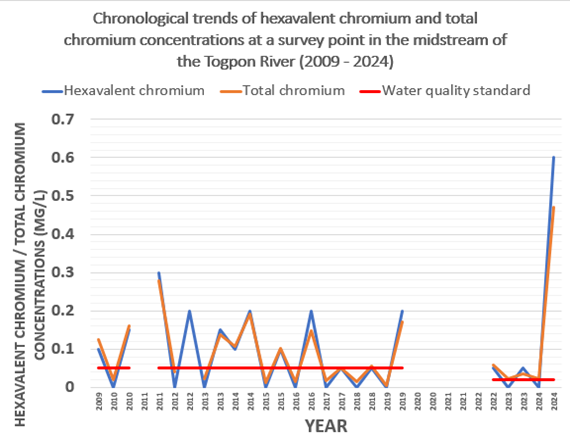
Figure: Chronological trends of hexavalent chromium and total chromium concentrations at a survey point in the midstream of the Togpon River (excerpt from the attached report)
According to the report (December 4, 2024) (attached to this request), which compiled the results of the 15-year investigation by the same expert, the levels of hexavalent chromium and total chromium in the Togpon River are lower during the dry season, while during the rainy season they significantly exceed the Japanese Environmental standard and the Japanese Water Supply Act standard (both 0.05 mg/L, and 0.02 mg/L after the revision) (see the figure above). In addition, during the most recent rainy season in September 2024, when heavy rainfall continued day after day, highest concentrations of hexavalent chromium (0.6 mg/L) and total chromium (0.471 mg/L) were observed in 15 years, equivalent with 24 to 30 times higher than the standards (see the photo below). The latest environmental standards in the Philippines stipulate the standard for hexavalent chromium as 0.01 mg/L for freshwater (the effluent standard is 0.02 mg/L) and as 0.05 mg/L for marine water (the effluent standard is 0.1 mg/L)[4], while the drinking water standard stipulates 0.05 mg/L for total chromium[5]. And therefore, it also comes as no doubt that the above-mentioned values exceed the standards in the Philippines.
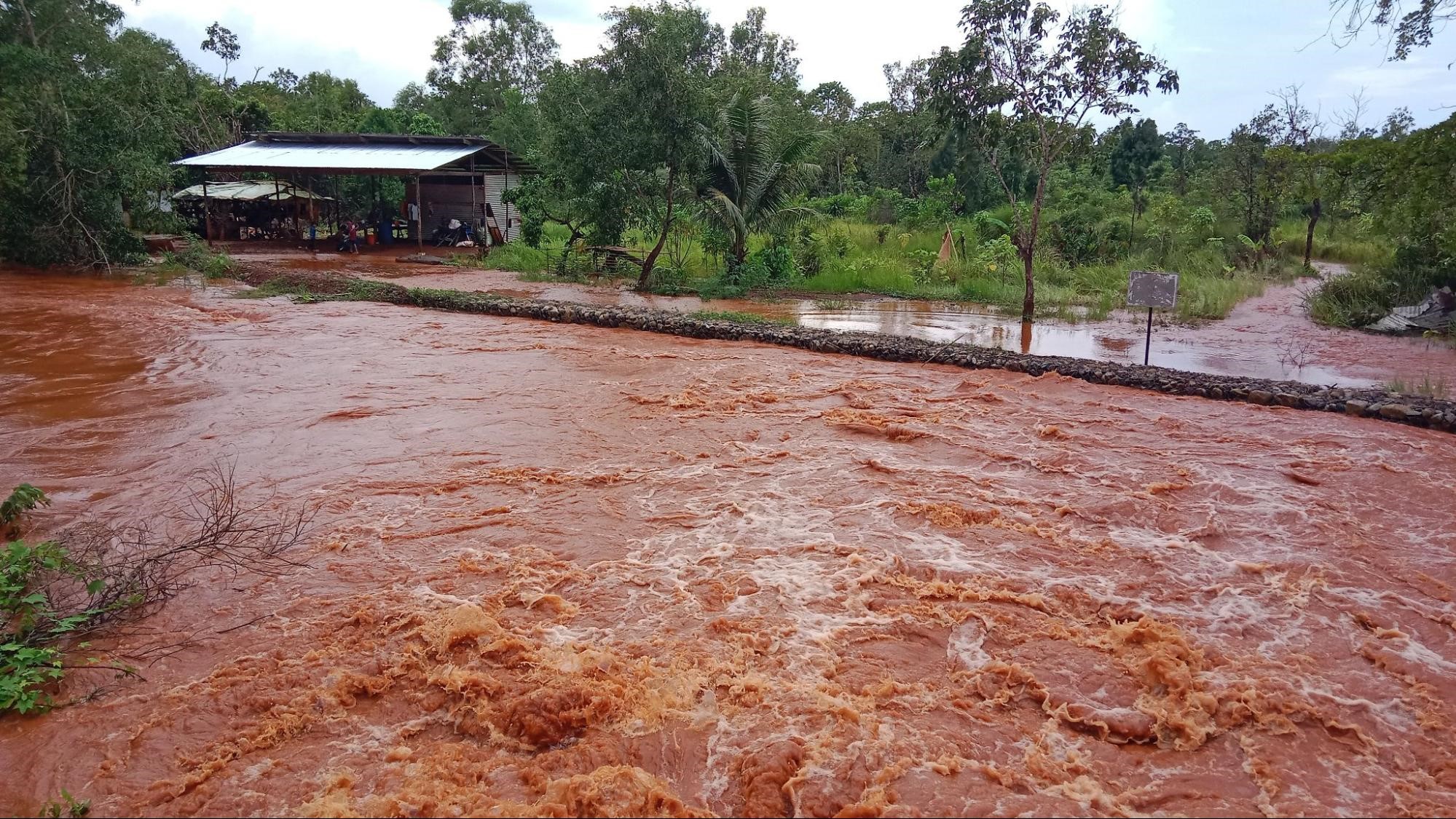
Photo: Togpon River in Bataraza, Palawan, where heavy rains continued day after day (September 2024; FoE Japan)
The report also points out that the ongoing operations at the existing mine site have caused not only severe hexavalent chromium contamination but also nickel contamination in the Togpon River, and that toxic sludge sediments brought into the Rio Tuba estuary may be causing further destruction of the ecosystem.
You have explained that CBNC, in cooperation with RTNMC, has been taking measures to reduce the discharge of hexavalent chromium since about 2012, such as covering low-grade ore piled in the open fields, expanding and widening the settling ponds, and installing activated carbon near the outlet of a settling pond that leads to the Togpon River. However, for the past 15 years, the water contamination situation in the Togpon River has shown no signs of improvement. This means that CBNC and RTNMC have failed to take effective pollution control measures and have not been able to properly manage pollution discharges from the mining site.
With extreme weather phenomena occurring more frequently in recent years, and flooding and landslides due to rainstorms increasing, the observation of the largest level of hexavalent chromium in 15 years during the 2024 rainy season, when heavy rains continued, implies that more destructive environmental pollution could be caused in the future. Moreover, as long as the project operators have failed to take effective pollution mitigation measures, it is not hard to assume that new mining activities by the RTNMC at Mt. Bulanjao will cause similar environmental pollution in other rivers, as mentioned at the beginning of this letter. In other words, residents who depend on rivers sourced from Mt. Bulanjao for water used for their daily lives, agriculture, etc., may suffer health damage, adverse effects on their livelihoods, etc., for decades to come.
You import all the nickel-cobalt mixed sulfide produced by CBNC to your plants in Japan to produce battery materials[6], etc. And CBNC is a wholly owned subsidiary of your company. You also have a 26% stake in Nickel Asia Corporation (NAC)[7], the largest shareholder (60%) in RTNMC, and are therefore responsible as an equity holder.
Your company’s “Responsible Mineral Sourcing Policy”[8] stipulates that you do not buy minerals that may be associated with human rights violations, environmental destruction. Further, with regard to the human rights violations to be caused/being caused by the mining operations of RTNMC, the raw material supplier for the smelting operations by CBNC, that is, the human rights violations in the supply chain, appropriate due diligence should be conducted in accordance with your company’s “Policy on Human Rights”[9] based on international norms such as the “UN Guiding Principles on Business and Human Rights”.
The long-term threat to the well-being of local communities living around Mt. Bulanjao by the expansion of nickel development, which is considered essential to decarbonization efforts, is not a “ just” energy transition and should not be tolerated. We call on your company to immediately suspend CBNC’s smelting operations until you can properly conduct human rights due diligence on local communities adversely affected by nickel development and ensure that effective environmental pollution countermeasures are developed and implemented at nickel development sites in Palawan. In suspending the project, adequate consideration must also be given to the workers, including taking measures to maintain the daily lives of the related workers.
Attachment:
“Environmental Pollution by Hexavalent Chromium, etc. Caused by Nickel Mining and Smelting Operations in Rio Tuba, Palawan Island” by Junichi Onuma (Nagoya University Disaster Research Group) (December 4, 2024)
LIST OF SIGNATORIES:
This letter is signed by 86 organizations, including those working at international and regional levels plus organizations working nationally in 39 countries.
INITIAL SIGNATORIES
Environmental Legal Assistance Center (ELAC)
Legal Rights and Natural Resources Center (LRC) / FoE Philippines
Pacific Asia Resource Center (PARC)
Friends of the Earth Japan
Philippines
Alyansa Tigil Mina (ATM)
Ang Aroroy Ay Alagaan, Inc (4As)
Apostolic Vicariate of Taytay
Bantay Kita
Center for Energy, Ecology, and Development (CEED)
Center for Environmental Concerns – Philippines
COALITION AGAINST LAND GRABBING (CALG)
Convergence of Initiatives for Environmental Justice (CIEJ)
Cordillera Peoples Alliance
Episcopal Commission on Indigenous Peoples (ECIP)
Freedom from Debt Coalition
NTFP EP Philippines
SIBUYANON Against Mining-SAM
Tambayan Center for Children’s Rights, Inc.
UNLAD-BLFFA
International and regional organizations
Arab and North Africa Region of La Via Campesina ARNA
Batani Foundation
Climate Rights International
Friends of the Earth Asia Pacific
Friends of the Earth Europe
Friends of the Earth International
GAIA Asia Pacific
Yes to Life, No to Mining global solidarity network
Albania
Environmental center for Development Education and Networking (EDEN)
Argentina
Tierra Nativa / Amigos de la Tierra Argentina
Australia
Aid/Watch
Bangladesh
Bangladesh Environmental Lawyers Association
Bangladesh Krishok Federation
Bosnia and Herzegovina
FOEE Bosnia and Herzegovina / Centar za životnu sredinu
Brazil
Friends of the Earth Brazil
Canada
MiningWatch Canada
China, Hong Kong
China Labour Bulletin
Costa Rica
COECOCEIBA – Amigos de la Tierra Costa Rica
Denmark
NOAH – Friends of the Earth Denmark
France
Amis de la Terre France / Friends of the Earth France
Germany
PowerShift
urgewald
Ghana
AbibiNsroma Foundation
India
mm&P (mines,minerals & PEOPLE)
Indonesia
AEER
Aksi! for gender, social and ecological justice
Center of Economic and Law Studies (CELIOS)
Jaringan Advokasi Tambang (JATAM)
KRuHA
TKPT Indonesia
Trend Asia
Wahana Lingkungan Hidup Indonesia (WALHI)/FoE Indonesia
Yayasan PUSAKA Bentala Rakyat
Japan
Human Rights Now
Japan Center for a Sustainable Environment and Society (JACSES)
Japan International Volunteer Center (JVC)
Japan Tropical Forest Action Network (JATAN)
Mekong Watch
Luxembourg
Mouvement Ecologique – Friends of the Earth Luxembourg
Madagascar
Centre de Recherches et d’Appui pour les Alternatives de Développement – Océan Indien (CRAAD-OI)Dé
Malaysia
Sahabat Alam Malaysia – Friends of the Earth Malaysia
Malta
Friends of the Earth Malta
Mexico
Otros Mundos Chiapas/Amigos de la Tierra México
Mongolia
Centre for Human Rights and Development
Mozambique
JA!Justica Ambiental
Netherlands
Milieudefensie
SOMO
Norway
SINTEF Digital
Pakistan
Pakistan Fisherfolk Forum
Palestine
FoE Palestine/The Palestinian Environmental NGOs Network (PENGON)
Palestinian Agricultural institutions coalition (PAIC)
Portugal
ZERO – Association for the Sustainability of the Earth System
Russia
Indigenous Russia Information Centre
Scotland
Friends of the Earth Scotland
South Korea
Solutions For Our Climate (SFOC)
Spain
Amigas de la Tierra /FoE Spain
SETEM
Sweden
Jordens Vänner/Friends of the Earth Sweden
Timor – Leste
La’o Hamutuk Institut
Togo
Les Amis de la Terre-Togo
United Kingdom
Campaign for Human Rights in the Philippines
Friends of the Earth England, Wales & Northern Ireland
London Mining Network
Uruguay
Redes / FoE Uruguay
United States of America
Friends of the Earth US
Honor the Earth
Malach Consulting
Cc:
Mr. Nobumitsu Hayashi, Governor of the Japan Bank for International Cooperation (JBIC)
Mr. Atsuo Kuroda, Chairman and CEO of Nippon Export and Investment Insurance (NEXI)
Business and Human Rights Policy Office, Trade Policy Bureau, Ministry of Economy, Trade and Industry (METI)
Trade and Investment Consultation Division on Business and Human Rights, Japan External Trade Organization(JETRO)
Initiative for Responsible Mining Assurance (IRMA)
Mr. Elon Musk, CEO, Tesla, Inc.
Mr. Masahiro Shinada, Chief Executive Officer (CEO), Panasonic Corporation
Mr. Koji Sato, President, Member of the Board of Directors (Representative Director, Toyota Motor Corporation
Mr. Masamichi Okada, President, Primearth EV Energy Co., Ltd.
Contact:
Friends of the Earth Japan
1-21-9 Komone, Itabashi-ku, Tokyo 173-0037, Japan
TEL: 03-6909-5983 FAX: 03-6909-5986
E-mail: hatae@foejapan.org
[1] https://www.smm.co.jp/en/news/release/2025/01/001934.html
[2] IEA “Global Critical Minerals Outlook 2024” p.136-153(https://iea.blob.core.windows.net/assets/ee01701d-1d5c-4ba8-9df6-abeeac9de99a/GlobalCriticalMineralsOutlook2024.pdf )
[3] Mr. Junichi Onuma (Nagoya University Disaster Research Group, former chief researcher at the Aichi Prefecture Environmental Research Center)
[4] the Philippine Department of Environment and Natural Resources (DENR) Administrative Order No. 2016-08, “Water Quality Guidelines and Effluent Standards,” (2016. 5-year grace period)
[5] the Philippine Department of Health (DOH) “National Drinking Water Standards” (2017)
[6] The company’s battery materials have been officially adopted by Tesla, the largest electric vehicle company in the U.S., as well as by Toyota Motor Corporation for their in-car batteries.
[7] https://www.smm.co.jp/en/corp_info/location/overseas/
[8] https://www.smm.co.jp/en/sustainability/management/procurement/
[9] https://www.smm.co.jp/en/sustainability/management/humanrights_procurement/
For inquiries, please contact:
Anabelle Reyes, ELAC, belle.reyes0778@gmail.com
Leon Dulce, LRC/ FoE Philippines, ldulce.lrc@gmail.com
Shigeru Tanaka, PARC, office@parc-jp.org
Hozue Hatae, FoE Japan, hatae@foejapan.org
Reference:
Video clip “Behind decarbonization technologies: What the expansion of Rio Tuba nickel mine will bring”:
